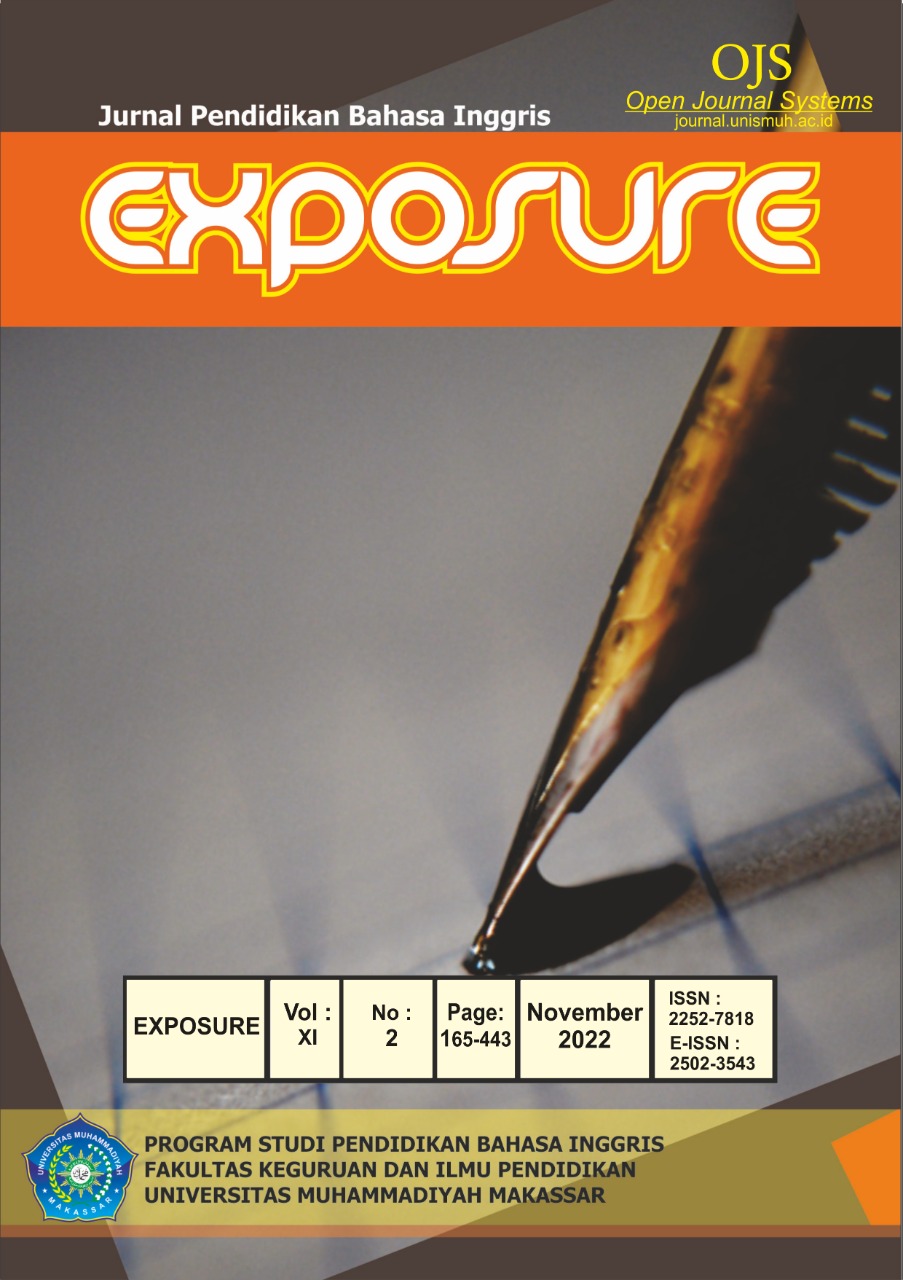METACOGNITIVE STRATEGY IN READING COMPREHENSION USED BY THE STUDENTS OF STKIP YAYASAN ABDI PENDIDIKAN PAYAKUMBUH
DOI: https://doi.org/10.26618/exposure.v11i2.9204
Metacognitive Strategy, Reading Comprehension, STKIP Students
Abstract
This study is descriptive qualitative. The sample of this study was sixth semester students in English department of STKIP Abdi Pendidikan Payakumbuh. There were 31 students. The writer choose the sample by using purposive sampling technique. The instrument of this study was the questionnaire which was consist of 30 items based on survey of reading strategy developed by Mokhtary and Sheorey in 2002. Based on data analysis the data can be shown as follow: in using Global Strategy; 8.44% students chose always, 36.22% students chose often, 43.67% students chose sometime, 10.91% students chose seldom and 0.74% students chose never. Meanwhile, in using problem solving Strategy; 12.91% students chose always, 43.15% students chose often, 38.737% students chose sometime, 3.63% students chose seldom and 1.61% students chose never. Last, in using support strategy; 15.43% students chose always, 36.2% students chose often, 35.12% students chose sometime, 11.83% students chose seldom and 1.43% students chose never. Based on the data, it can be concluded that metacognitive strategy in reading comprehension applied by the students were Support strategy and then followed by Problem – solving strategy and Global strategy.
Keywords: metacognitive strategy, reading comprehension, STKIP students
References
Ahmadi, M. R., Ismail, H. N., & Abdullah, M. K. K. (2013). The Importance of Metacognitive Reading Strategy Awareness in Reading Comprehension. English Language Teaching. Vol. 6: 10 (235-244).
Chamot, A.U. & O’Malley, J.M. (1990). Learning Strategies in Second Language Learner. Toronto : OISE.
Cross, D. R., & Paris, S. G. (1988). Developmental and instructional analyses of children's metacognition and reading comprehension. Journal of educational psychology, 80(2), 131.
Flavell, J. H. (1979). Metacognition and cognitive monitoring: A new area of cognitive- developmental inquiry. American Psychologist, 34(10), 906-911.
Forrest-Pressley, D. L., & Wallter, T. G. (1984). Cognition, metacognition, and reading. New York: Spinger-Verlag. Journal, 73(2), 121-134.
Goodman, K. S. (1988). The reading process.In P. L. Carrell; J.
Devine; D. E. Eskey(eds.), Interactive approaches to second language reading (pp. 11-21). New York: Cambridge University Press.
Haller, E. P., Child, D. A., & Walberg, H. J. (1988). Can comprehension be taught? A quantitative synthesis of metacognitive studies. Educational Researcher, 17(9), 5-8.
MacLeish, A. (1968). Adapting and composing reading texts. TESOL Quarterly, 2(1), 43-50.
Nunan, D. (1991). Language teaching methodology: A textbook for teachers. London: Prentice Hall.
Mokhtari, K & Sheorey, R. 2002. Measuring ESL Students’ Awareness of Reading Strategies. Journal of Development Education, 25(3), 2-10.
Nunan, David. 2003. Practical English Language Teaching. New York. McGraw Hill Companies
Oxford, Rebecca L. 1990. Language Learning Strategies : What Every Teacher Should Know.. Boston, Massachusetts. Heinle & Heinle
Pearson, P. D., & Gallagher, M. C. (1983). The instruction of reading comprehension. Contemporary Educational Psychology, 8, 317-345.
Wijayanti, A. P. (2013). A descriptive study of metacognitive strategies in the English language teaching and learning process at SMPN 1 Probolinggo (Undergraduate theses, Universitas Jember, Indonesia). Retrieved from http: //repository.unej.ac.id/ handle /123456789/11284
Zhang, L. A., & Sheepo, S. (2013). Metacognitive strategy use and academic reading achievement: Insights from a Chinese context. Electronic Journal of English Language Teaching, 10(1), 54-69.
Downloads
Published
How to Cite
Issue
Section
License
Authors who publish with this journal agree to the following terms:
In order to assure the highest standards for published articles, a peer review policy is applied. In pursue of the compliance with academic standards, all parties involved in the publishing process (the authors, the editors and the editorial board and the reviewers) agree to meet the responsibilities stated below in accordance to the Journal publication ethics and malpractice statement.
Duties of Authors:
- The author(s) warrant that the submitted article is an original work, which has not been previously published, and that they have obtained an agreement from any co-author(s) prior to the manuscript’s submission;
- The author(s) should not submit articles describing essentially the same research to more than one journal;
- The authors(s) make certain that the manuscript meets the terms of the Manuscript Submission Guideline regarding appropriate academic citation and that no copyright infringement occurs;
- The authors(s) should inform the editors about any conflict of interests and report any errors they subsequently, discover in their manuscript.
Duties of Editors and the Editorial Board:
- The editors, together with the editorial board, are responsible for deciding upon the publication or rejection of the submitted manuscripts based only on their originality, significance, and relevance to the domains of the journal;
- The editors evaluate the manuscripts compliance with academic criteria, the domains of the journal and the guidelines;
- The editors must at all times respect the confidentiality of any information pertaining to the submitted manuscripts;
- The editors assign the review of each manuscript to two reviewers chosen according to their domains of expertise. The editors must take into account any conflict of interest reported by the authors and the reviewers.
- The editors must ensure that the comments and recommendations of the reviewers are sent to the author(s) in due time and that the manuscripts are returned to the editors, who take the final decision to publish them or not.
Authors are permitted and encouraged to post online a pre-publication manuscript (but not the Publisher’s final formatted PDF version of the Work) in institutional repositories or on their Websites prior to and during the submission process, as it can lead to productive exchanges, as well as earlier and greater citation of published work (see The Effect of Open Access). Any such posting made before acceptance and publication of the Work shall be updated upon publication to include a reference to the Publisher-assigned DOI (Digital Object Identifier) and a link to the online abstract for the final published Work in the Journal.














